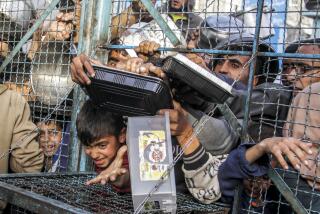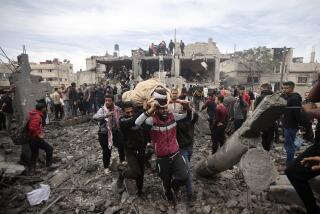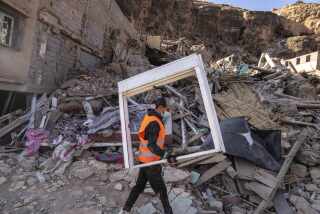Mostar, Bosnia’s Forgotten City, May Get 1st Relief Convoy Since June 15 : Balkans: 35,000 Muslims are trapped in the eastern part of the town. The republic’s Croats want it for their capital.
- Share via
ZAGREB, Croatia — U.N. officials negotiated feverishly Thursday for access to the embattled city of Mostar and appeared on the verge of winning passage for the first relief convoy to reach the southern Bosnian enclave in more than two months.
With the world’s attention focusing on Sarajevo, U.N. and aid agency officials are expressing mounting frustration at the more critical plight of 35,000 Muslims trapped in eastern Mostar, which has been without substantial food, water or electricity since the last U.N. convoy arrived on June 15.
The situation has been critical since mid-May, when a breakdown in the alliance between Bosnia’s Muslims and Croats turned the historic old city into a battleground. Thousands of Muslims were left trapped between Serbian forces in the mountains behind them and Croatian forces on the western side of the city across the Neretva River.
Since then, some small private aid deliveries have reached Croats in western Mostar, but the Muslims in the east are surviving on food hauled in by donkey and on horseback. U.N. officials say they believe conditions there are “appalling” but cannot see for themselves because they have been unable to reach the besieged Muslim community.
“It’s much worse than Sarajevo,” said a Zagreb-based aid worker who reached the Croatian side of the city within the past several days. “In Sarajevo they have sniper fire and indiscriminate shelling. In Mostar, it’s street to street fighting, and building to building. They fight for one building and then move down the street. The place is just history. There’s nothing left. It’s like the pictures you saw from late-’70s Beirut.”
While private, mostly Catholic, aid organizations have been able to make some deliveries to the Croatian side, he said, “On the Muslim side there is no water, no electricity or food, and they’re literally pinched on that side. They have no elbow room, nowhere to go.”
U.N. civil affairs chief Cedric Thornberry traveled from Zagreb to Mostar on Thursday to spend the day negotiating with Bosnian Croat forces for access to the city. He was scheduled to begin talks again today.
As a result of the talks, Spanish U.N. troops that have unsuccessfully tried to reach the city for several weeks were permitted to make a small delivery of medical supplies to the Croatian side on Thursday.
“That’s part of what they hope is a continuing program to try to get some supplies in to both sides, if they can manage it. But we’ll have to wait and see,” said Brett Lodge, U.N. spokesman in Zagreb.
Manoel Almeida e Silva, spokesman in Zagreb for the U.N. high commissioner for refugees, said his office has been in touch with the Bosnian Croat leadership every day since the last U.N. relief convoy was allowed into Mostar in June. “They tell us we can’t go in because they wouldn’t be able to guarantee our security.”
The issue of Mostar, which Bosnian Croats consider their capital in territory they are claiming within Bosnia-Herzegovina, has been a central point of peace talks now under way in Geneva.
The talks continued for a fourth day Thursday without substantial progress as the president of Bosnia’s Muslim-led government, Alija Izetbegovic, expressed concern at the continuing presence of as many as 200 Serbian troops on strategic Mt. Igman overlooking Sarajevo.
U.N. officials privately downplayed the possibility that the continued Serbian presence on the peak would trigger air strikes by the North Atlantic Treaty Organization. They said it appeared that the Serbs were prepared for a full withdrawal but had left some troops behind to supervise the withdrawal of their supplies from the mountaintop.
“The troops are relaxed; they are ready to withdraw,” U.N. spokesman Cmdr. Barry Frewer said.
The final decision on ordering air strikes lies with U.N. Secretary General Boutros Boutros-Ghali, and a spokesman for the secretary general’s special representative in the former Yugoslav republics, Vigleik Eide, refused to link the possibility of air strikes with the continued Serbian presence on the mountain.
But as discussions continue about alleviating the threat posed by the Serbs against Bosnia’s Muslim population, U.N. and other aid officials say that it is the Croats, against whom no air strikes or other military measures are contemplated, who pose the most serious threat to Muslims in Mostar.
Fighting between Muslims and Croats in central and southern Bosnia threatens up to 2.2 million civilians who may be at risk in the winter ahead if relief routes through the region are not opened up.
“The irony of the situation is, it’s really the Croat-Muslim fighting that’s holding things up, and the Serbs aren’t even involved,” one aid official said.
In an initiative announced earlier this month, the United Nations launched Operation Lifeline, an attempt to establish a special humanitarian supply route from the Adriatic Sea coast through Mostar to the main U.N. relief agency warehouses in Sarajevo, Zenic and Tuzla.
“The situation now is different from what it was last year, because people then had some reserves for the winter. This year, they don’t have that,” said one official involved in the project.
More to Read
Sign up for Essential California
The most important California stories and recommendations in your inbox every morning.
You may occasionally receive promotional content from the Los Angeles Times.













